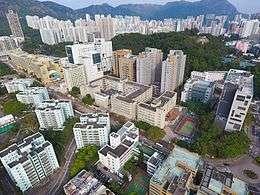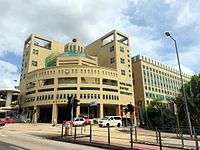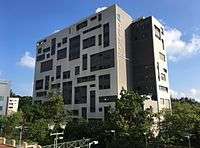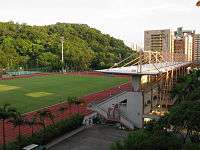Hong Kong Baptist University
Hong Kong Baptist University (HKBU) is a publicly funded tertiary liberal arts[1] institution with a Christian education heritage. It was established as Hong Kong Baptist College with the support of American Baptists, who provided both operating and construction funds and personnel to the school in its early years. It became a public college in 1983.
香港浸會大學 | |
 Emblem of HKBU | |
| Motto | 篤信力行 |
|---|---|
Motto in English | Faith and Perseverance |
| Type | Public |
| Established | 1956 (as Hong Kong Baptist College) 1994 (granted full university status) |
| Chairman | Clement C J Chen |
| Chancellor | Chief executive of Hong Kong (Current officeholder: Carrie Lam) |
| President | Roland T Chin |
| Vice-president | Yike Guo (Research & Development) Albert Chau (Teaching & Learning) Andy Lee (Administration) |
| Provost | Clayton Mackenzie |
| Students | 10,598 |
| Undergraduates | 6917 |
| Postgraduates | 2845 |
| Location | , Hong Kong |
| Colours | Blue |
| Affiliations | ASAIHL, ACUCA |
| Website | hkbu |
 | |
| Hong Kong Baptist University | |||||||||||||
|---|---|---|---|---|---|---|---|---|---|---|---|---|---|
| Traditional Chinese | 香港浸會大學 | ||||||||||||
| Simplified Chinese | 香港浸会大学 | ||||||||||||
| Cantonese Yale | Hēunggóng Jamwuih Daaihhohk | ||||||||||||
| |||||||||||||

It became Hong Kong Baptist University in 1994 during the presidency of Dr. Daniel Tse Chi-wai, LLD, GBS, CBE, JP, who succeeded the Founding President, Dr. Lam Chi-fung,[2] as the second president of the University in 1971. After 30 years of services to the University, Dr. Daniel Tse Chi-wai retired in 2001 and Prof. Ng Ching-fai, GBS, was appointed as the third president of the University. In 2010, Prof. Albert Chan Sun-chi assumed office as the fourth president of HKBU. In 2015, Prof. Roland Chin was appointed as the fifth President of HKBU.
HKBU has five main campuses: Ho Sin Hang Campus (1966), Shaw Campus (1995), Baptist University Road Campus (1998), Kai Tak Campus (2005), and Shek Mun Campus (2006) for the College of International Education and the Hong Kong Baptist University Affiliated School Wong Kam Fai Secondary and Primary School. The first three campuses are located in the urban heart of Kowloon Tsai, while the Kai Tak Campus is located on Kwun Tong Road and the Shek Mun Campus in the Shek Mun area of Sha Tin District.
In 2005, the University established the Beijing Normal University – Hong Kong Baptist University United International College (UIC) in Zhuhai, China. The college was the first tertiary education institution founded through collaboration between a Mainland university and a Hong Kong university.
History
The Hong Kong Baptist College was opened on 11 September 1956 on the premises of the Pui Ching Middle School, a Baptist-affiliated secondary school, with an initial enrolment of 152 students.[3] In 1957 the government gave the college land on Waterloo Road to build a permanent campus, which was completed in 1966.[3]
The Hong Kong Baptist College Bill 1983 was passed by the Legislative Council on 10 August 1983.[4] The college previously fell under the purview of the Post Secondary Colleges Ordinance and received funding from the Education Department. After this bill became law, the college instead began to receive funding from the University and Polytechnic Grants Committee.[5]
The third reading of the Hong Kong Baptist College (Amendment) Bill was passed by the Legislative Council on 16 November 1994, transforming the college into the Hong Kong Baptist University.[6][7]
University identities
Emblem
The emblem of Hong Kong Baptist University consists of three pictorial elements: the Bible, waves and knots. The Bible symbolises the unique quality of Christian education which includes moral and spiritual training in addition to academic education. The waves, on the other hand, symbolise both Hong Kong's geographic nature as an island while echoing Confucius' dictum that "the wise love water" and the University's continuing effort to improve its educational quality. The knots, the final symbol, illustrate that within God's embrace, Christians are harmoniously linked and loved.
Logo
The logo, embodying a book and water motifs, was adopted after the institution was granted its university status in 1994. The acronym "BU" coupled with the outlined book on the logo resembles the Chinese characters of welcome (迎) and progress (進), conceptualising the merging of eastern and western cultures. The design of the logo was commended at a design competition held in October 1996. The Hong Kong Designers Association awarded a Certificate of Merit at the Design 96 Show to Kan & Lau Design Consultants for creating the logo.
Governance
Prior to Hong Kong's handover, the colony's governor was the de jure chancellor of the university. That role has been assumed by Hong Kong's chief executive following the handover.
The chief executive's role as the university's Chancellor is enshrined in the Hong Kong Baptist University Ordinance.[8]
For a list of pre- and post-handover university chancellors, refer to the articles for the Governor of Hong Kong and the Chief executive of Hong Kong.
Academic organisations and rankings
Faculties and Schools
Rankings
| University rankings | |
|---|---|
| Global – Overall | |
| ARWU World[9] | 501–600 |
| THE World[10] | 401–500 |
| USNWR Global[11] | 545 |
| QS World[12] | 261 |
| Regional – Overall | |
| THE Asia[1] | 55 |
| QS Asia[13] | 65 |
According to Times Higher Education World University Rankings (THE), HKBU was ranked 60th of the World University Impact Ranking and 70th of Top 100 Universities of Asia in 2019.[1] HKBU was also ranked 261th of the Top Universities in the World by QS World University Rankings, 27th of the QS University "50 under 50" by QS World University Rankings in 2020 and 58th for Asian Universities QS World University Rankings in 2020.[14]
In 2020, HKBU was among top 151-175 universities in computer science according to THE.[15] It is also among the top 51-100 and 100-150 universities in theology and philosophy according to QS.
The Hong Kong government Research Assessment Exercise[16] gave the Geography Department the highest ranking of all Hong Kong Geography Departments, in terms of its research, with 12% of research output considered "world leading" and 31% "international excellent".[17]
The School of Communication is famous, Department of Journalism under the School was ranked by Asian Correspondent as Top 10 Journalism School for Asian Students.[18] Columbia University was also on the list.
Major facilities



The campus is located in Kowloon City District.[19]
Academic Community Hall
The Academic Community Hall (AC Hall) is an auditorium located in the university. It was opened in May 1978 with a seating capacity of 1,346. Originally, the first president and co-founder of the university, Dr. Lam Chi-fung, conceived the idea of building a hall for university functions. In 1970, on the occasion of their Golden Wedding Anniversary, Dr. and Mrs. Lam donated half a million dollars towards the construction of the auditorium. A local architect, Eric Cumine, took charge of the project. However, Dr. Lam died the following year before the project got underway. The Board of Governors decided to honour Dr. Lam by expanding the planned auditorium into a much larger scale project – the development of the Lam Chi-fung Memorial Building. As a part of the project, the Academic Community Hall would serve as a cultural centre for the university and its surrounding community, thus providing a direct link between town and gown.
Communication and Visual Art Building
The Communication and Visual Art Building is located in 5 Hereford Road, Kowloon Tong. The building was built for the School of Communication and Academy of Visual Arts.
Library
The Hong Kong Baptist University Library is made up by a Main Library and a number of branches. The Main Library is located in Au Shue Hung Memorial Library Building and has a gross floor area of 6,900 m² with a seating capacity of about 850. The library is fully automated with integrated library systems and house a comprehensive collection of Chinese and Western books, periodicals, non-print materials and newspaper clippings. Of particular importance are the Archives on the History of Christianity in China and the Contemporary China Research Collection, as well as a lantern slide and glass plate negative collection entitled "China Through The Eyes of CIM Missionaries."
Dr. Stephen Riady Chinese Medicine Library is located on the second floor of the Jockey Club of School of Chinese Medicine Building. It aims to meet the growing demand in the development of Chinese medicine in Hong Kong. The European Documentation Centre is located in the Academic and Administrative Building and is open to the public. It provides an important study and research base for European Studies. The Shek Mun Campus Library is a branch of the Hong Kong Baptist University Library. It is established to provide quality information resources and services in support of teaching and learning activities of the College of International Education in Shek Mun Campus.
After investigation, the library decided to abandon the practice of binding the majority of its western language periodical collection from 2007 onwards, substituting it with magazine boxes and possibly shrink wrapping.[20]
Students' residences
The Student Residence Halls of HKBU are located at the Baptist University Road campus:
- Chen-Ning Yang Hall (楊振寧堂)
- Shu-Ren Zhou Hall (周樹人堂)
- Yuan-Pei Cai Hall (蔡元培堂)
- Ching-Ling Soong Hall (宋慶齡堂)
The College of International Education
The College of International Education (CIE), which is under the School of Continuing Education, offers programmes from certificates, higher diplomas, professional diplomas, associate degrees, undergraduate and higher degrees for over 6,300 full-time students and 8,200 part-time students to have the opportunities to pursue further study. CIE has their academic activities mainly in the new Shek Mun Campus (8 on Muk Street, Shek Mun, Shatin). The rest of the academic activities are based in Madam Chan Wu Wan Kwai School of Continuing Education Tower on campus, and acquired a 48,000 sq. ft. office in Franki Centre, Kowloon Tong.
Centre for Sino-Christian Studies
The Centre for Sino-Christian Studies was established on 1 July 2001 with the purpose of promoting studies in Christianity from within Chinese cultural and religious contexts.[21][22][23] It is recognized as a theological institution within the Hong Kong Baptist University[24] and aims to achieve its objectives through its various research projects, conferences, and publications that cover the areas of Christian theology, religious philosophy, and social ethics.[25] While its parallel institute, the Centre for Applied Ethics focuses on research activities related to applied ethics, the Centre for Sino-Christian Studies primarily focuses on Sino-Christian Theology. The Education Bureau of the Government of the Hong Kong Special Administrative Region lists it as one of resource centres for ethics and religious studies.[26] Prof. Kai-man Kwan, who was among the founding members of the centre and who has also served as its research project co-ordinator since its establishment in 2001, is the current director of the centre.[27][28]. From 2011-2014, it was one of the participating research centres in the Global Network for Public Theology of the University of Chester.[29] It is also a partner institution of Centre for Religion in Society of York St John University.[30] The centre also organizes conferences for the promotion of Sino-Christian studies.[31]
Notable scholars
- Prof. Adrian Bailey -Geography
- Prof. Douglas Robinson -English
- Prof. KWAN Kai-man -Philosophy
- Prof. PALMQUIST Stephen R -Philosophy
See also
- Education in Hong Kong
- List of universities in Hong Kong
References
- "About AC Hall". Hong Kong Baptist University. Retrieved 4 September 2016.
- "HKBC: the early years of a Christian college". South China Morning Post. 2 December 1994.
- "Baptist College Bill is Passed". South China Morning Post. 11 August 1983. p. 8.
- "Baptist College is 'almost there'". South China Morning Post. 1 July 1983. p. 14.
- "New universities". South China Morning Post. 17 November 1994. p. 6.
- Chau, Mimi (24 November 1994). "College to issue souvenir covers". South China Morning Post. p. 11.
- "Hong Kong Baptist University Ordinance" (PDF). Hong Kong Baptist University. Retrieved 20 February 2017.
- Academic Ranking of World Universities 2018
- Hong Kong Baptist University – US News Best Global Universities
- Hong Kong Baptist University. QS Top Universities.
- QS Asian University Rankings 2019
- "Hong Kong Baptist University Rankings". Top Universities. Retrieved 9 February 2019.
- "Hong Kong Baptist University − World University Rankings". Times Higher Education.
- "Research Assessment Exercise". Research Assessment Exercise. Archived from the original on 23 September 2015. Retrieved 12 June 2015.
- "Results of the Research Assessment Exercise 2014" (PDF). Results of the Research Assessment Exercise 2014. Retrieved 12 June 2015.
- "Top 10 journalism schools for Asian students – Asian Correspondent". Retrieved 12 June 2015.
- "Kowloon City District Map" (PDF). Electoral Affairs Commission. Retrieved 30 August 2019.
- Frost, Janet; Woo, Wing (2007). "Binding dilemma: Changing horses mid stream — Or why we stopped binding periodicals at HKBU". Library Collections, Acquisitions, & Technical Services. 31: 85–95.
- LAU, Timothy (2008). 'A Chinese fish thinks about Chinese water': The cultural engagement of Christian theology in the emerging Sin-Christian context. PhD Thesis. Victoria: Australian Catholic University. p. 5. Retrieved 3 July 2020.
- "Centre for Sino-Christian Studies". Research Centres and Institutes. Hong Kong Baptist University. Retrieved 18 June 2020.
- "Introduction, Centre for Sino-Christian Studies". Retrieved 18 June 2020.
- Kusmierz, Katrin (2011). Theology in Transition: Public Theologies in Post-Apartheid South Africa. Zurich: LIT Verlag Münster. p. 41.
- "Introduction, Centre for Sino-Christian Studies". Retrieved 18 June 2020.
- "Ethics and religious studies: Links". Education Bureau, Government of HKSAR. Retrieved 18 June 2020.
- "Introduction, Centre for Sino-Christian Studies". Retrieved 18 June 2020.
- "Kai-man Kwan". Faculty profile, Department of Religion and Philosophy. Retrieved 18 June 2020.
- "Global Network for Public Theology". University of Chester. Retrieved 1 July 2020.
- "Partner Institutions". York St John University. Retrieved 2 July 2020.
- "Activities". Centre for Sino-Christian Studies. Retrieved 1 July 2020.
External links
| Wikimedia Commons has media related to Hong Kong Baptist University. |